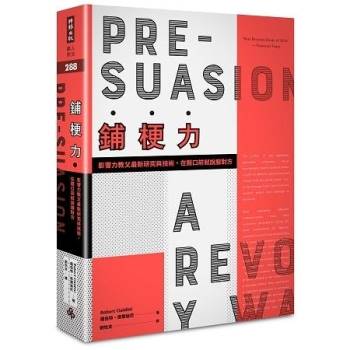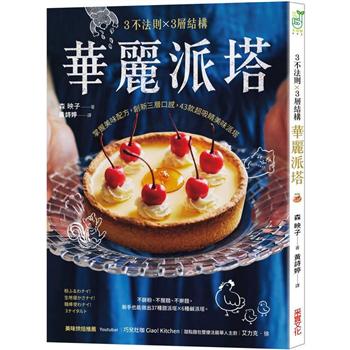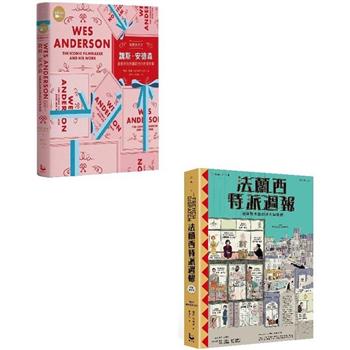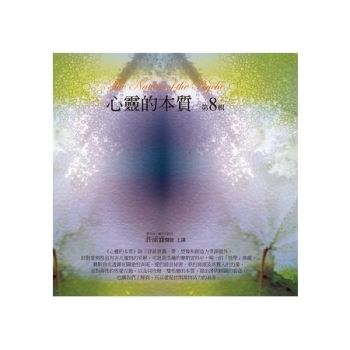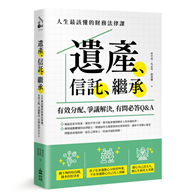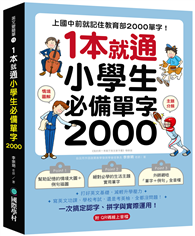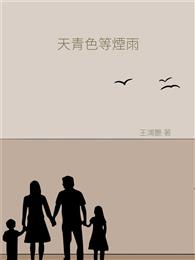編者的話
一、為誰而寫
這是一本為華語學習者和華語教學者所編寫的「常用華語難詞釋疑」的自學參考書。
二、為什麼寫
根據多年的教學觀察,不難發現華語學習者隨著語言程度的逐漸提高,詞彙量及語法點的日益增多,往往對於使用頻率高的常用詞例如:「了」、「不、沒」、「合適、適合、適當」、「不免、難免、免得、以免」等語義、語法、語用易產生困惑與混淆的現象。若一般詞書查找不易、教師解說不明,則沉痾難解。
呂叔湘先生曾指出:「一個詞彙語法形式可以從兩方面進行研究。可以研究它在語句結構裡的地位,另一方面,也可以研究它出現的條件:什麼情況之下能用或非用不可?什麼情況之下不能用?或是必得用在某一別的成分之前或之後?等等。」前者是理論研究,後者是用法研究。當華語學習者需要通過大量的詞彙、語法來掌握及應用華語時,幾條簡易的語法規則確顯不足。故本書編寫的出發點是針對華語學習者在「視聽華語」或「當代中文」各冊書中感到困惑及發生錯誤頻率高的詞彙,從語義、語法、語用三方面加以說明與分析,並編配定量的練習,使學習者通過習作檢視自我學習的成效,且提供教師做為華語詞彙教學的參考。
三、說明
關於書中的語法專用詞語說明如下:
1.主語 Subject:句中陳述、描寫、說明的主題,也可以說是話題。
The subject is the theme of a statement or a description or illustration. It can also be a topic.
例:我看書。
2.謂語 Predicate:陳述、描寫、說明主語的。說明主語是什麼人或事物,主語做什麼、怎麼樣等。
The predicate serves to state, describe or illustrate the subject, telling who or what the subject is, what it does or how is it.
例:我看書。
3.賓語 Object:謂語動詞後面的連帶成分。表示動作的對象、產生的結果,或表示動作達到的處所、或動作所用的工具等等。
The object is a sentence element following the predicate verb indicating the target or result of an action, the place where the action reaches, or the instrument with the action is done.
例:我看書。
4.定語 Attributive:修飾、限制主語或賓語的詞或詞組稱為定語。被修飾的詞叫中心語。定語表示中心語的性質、狀態、數量、所屬、處所、時間、範圍等的前置成分。
A word or phrase which modifies or restricts the subject or object is called an attributive and the word modified by the attributive is called the head word. In other words, the attributive is the pre-modifier showing the property, quality, quantity, category, place, time or scope of what is denoted by the head word.
例:我看的書。
5.狀語 Adverbial adjuncts:修飾、限制謂語的詞或詞組稱為狀語。被修飾的詞叫中心語。狀語表示中心語的時間、處所、程度、範圍、情態、肯定、否定、重複、主動、被動、對象、原因等的前置成分。
A word or phrase modifying or restricting the predicate is called an adverbial adjunct and the word modifies is head word. In other words, the adverbial adjunct is pre-modifying element denoting the time, place, degree, scope, aspect, affirmation or negation, repetition, activeness or passiveness, target, reason, etc. of the head word.
例:我看的書,非常有趣。
6.補語 Complements:謂語動詞或形容詞中心語後補充說明謂語的詞或詞組稱為補語。補語是補充說明動作經歷的時間、數量、程度、結果、趨向或可能等。有時是形容、說明事物的性狀、數量、程度等的後置成分。
A word or phrase attached to a verb or adjective predicate to complete the meaning is called a complement. Complements are post-modifying elements to show the duration, quantity, degree, result, direction or possibility of an action; to illustrate the state, number, degree of a thing.
例:我看的書有趣極了。
四、致謝
本書是在外籍生華語詞彙應用錯誤的基礎上,深入探究歸結錯誤發生的原因,並根據華語文能力測驗考試大綱的範圍及標準編寫成簡明扼要的華語詞彙教學參考書,力圖幫助學生在短時間內對於詞彙的掌握有更大的突破,適合各級程度的華語學習者自學、備考及教師課堂教學參考。
儘管本書經過字斟句酌,但由於時間倉促,加之本人能力有限,其中不盡人意之處仍在所難免,切望讀者不吝賜教,以求精進。本書在編寫過程中,深受至友P「大樹理論」的啟發,輔大華語中心林玲俐老師及新學林出版公司范琇茹主編的大力支持,在此特致謝忱。
馮元玫
2017盛夏於台北
| FindBook |
有 6 項符合
華語詞彙難詞釋疑與應用的圖書 |
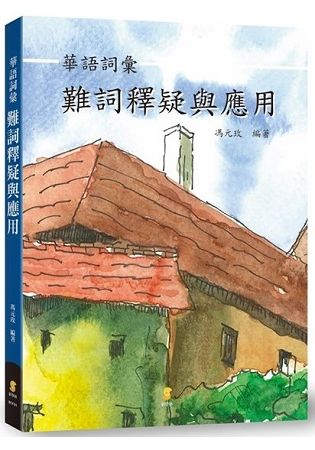 |
華語詞彙難詞釋疑與應用 出版社:新學林 出版日期:2017-09-05 語言:繁體中文 規格:平裝 / 336頁 / 16k/ 19 x 26 cm / 普通級/ 單色印刷 / 初版 |
| 圖書選購 |
| 型式 | 價格 | 供應商 | 所屬目錄 | $ 405 |
語言 |
$ 405 |
中文 |
$ 418 |
中文書 |
$ 419 |
高等教育 |
$ 428 |
閱讀/寫作 |
$ 428 |
閱讀/賞析 |
|---|
| 圖書館借閱 |
| 國家圖書館 | 全國圖書書目資訊網 | 國立公共資訊圖書館 | 電子書服務平台 | MetaCat 跨館整合查詢 |
| 臺北市立圖書館 | 新北市立圖書館 | 基隆市公共圖書館 | 桃園市立圖書館 | 新竹縣公共圖書館 |
| 苗栗縣立圖書館 | 臺中市立圖書館 | 彰化縣公共圖書館 | 南投縣文化局 | 雲林縣公共圖書館 |
| 嘉義縣圖書館 | 臺南市立圖書館 | 高雄市立圖書館 | 屏東縣公共圖書館 | 宜蘭縣公共圖書館 |
| 花蓮縣文化局 | 臺東縣文化處 |
|
|
圖書介紹 - 資料來源:TAAZE 讀冊生活 評分:
圖書名稱:華語詞彙難詞釋疑與應用
這是一本為華語學習者和華語教學者所編寫的「常用華語難詞釋疑」的自學參考書。編寫的出發點是針對華語學習者在「視聽華語」或「當代中文」各冊書中感到困惑及發生錯誤頻率高的詞彙,從語義、語法、語用三方面加以說明與分析,並編配定量的練習,使學習者通過習作檢視自我學習的成效,且提供教師做為華語詞彙教學的參考。
本書是在外籍生華語詞彙應用錯誤的基礎上,深入探究歸結錯誤發生的原因,並根據華語文能力測驗考試大綱的範圍及標準編寫成簡明扼要的華語詞彙教學參考書,力圖幫助學生在短時間內對於詞彙的掌握有更大的突破,適合各級程度的華語學習者自學、備考及教師課堂教學參考。
作者簡介:
馮元玫
學歷:
中國文化大學華語教學研究所碩士
經歷:
中國文化大學華語教學碩士學程專技助理教授
台北大學華語學程講師
德明財經科大應外系講師
師大、政大、清大、文大、僑委會華語師資培訓講師
TOP
作者序
編者的話
一、為誰而寫
這是一本為華語學習者和華語教學者所編寫的「常用華語難詞釋疑」的自學參考書。
二、為什麼寫
根據多年的教學觀察,不難發現華語學習者隨著語言程度的逐漸提高,詞彙量及語法點的日益增多,往往對於使用頻率高的常用詞例如:「了」、「不、沒」、「合適、適合、適當」、「不免、難免、免得、以免」等語義、語法、語用易產生困惑與混淆的現象。若一般詞書查找不易、教師解說不明,則沉痾難解。
呂叔湘先生曾指出:「一個詞彙語法形式可以從兩方面進行研究。可以研究它在語句結構裡的地位,另一方面,也可以研究...
一、為誰而寫
這是一本為華語學習者和華語教學者所編寫的「常用華語難詞釋疑」的自學參考書。
二、為什麼寫
根據多年的教學觀察,不難發現華語學習者隨著語言程度的逐漸提高,詞彙量及語法點的日益增多,往往對於使用頻率高的常用詞例如:「了」、「不、沒」、「合適、適合、適當」、「不免、難免、免得、以免」等語義、語法、語用易產生困惑與混淆的現象。若一般詞書查找不易、教師解說不明,則沉痾難解。
呂叔湘先生曾指出:「一個詞彙語法形式可以從兩方面進行研究。可以研究它在語句結構裡的地位,另一方面,也可以研究...
»看全部
TOP
目錄
編者的話 III
A
1. 愛護、愛惜 2
2. 安心、放心 4
3. 安定、穩定 6
4. 按照、根據」 8
5. 暗暗、悄悄、偷偷 10
B
6. 巴不得、恨不得 16
7. 擺、放 18
8. 幫忙、幫助 20
9. 保持、維持 22
10. 寶貴、珍貴 24
11. 抱歉、道歉 26
12. 本來、原來 28
13. 比、比較 30
14. 必須、必需 32
15. 遍、次 34
16. 變、變化、變成 36
17. 表達、表示、表現 38
18. 別的、另外、除了⋯⋯以外 40
19. 不、沒 42
20. 不管、儘管 45
21. 不免、難免、免得、以免 48
22. 不得不、只好 51
23. 不得了、了不得 53
24. 不是⋯⋯而是、不...
A
1. 愛護、愛惜 2
2. 安心、放心 4
3. 安定、穩定 6
4. 按照、根據」 8
5. 暗暗、悄悄、偷偷 10
B
6. 巴不得、恨不得 16
7. 擺、放 18
8. 幫忙、幫助 20
9. 保持、維持 22
10. 寶貴、珍貴 24
11. 抱歉、道歉 26
12. 本來、原來 28
13. 比、比較 30
14. 必須、必需 32
15. 遍、次 34
16. 變、變化、變成 36
17. 表達、表示、表現 38
18. 別的、另外、除了⋯⋯以外 40
19. 不、沒 42
20. 不管、儘管 45
21. 不免、難免、免得、以免 48
22. 不得不、只好 51
23. 不得了、了不得 53
24. 不是⋯⋯而是、不...
»看全部
TOP
商品資料
- 作者: 馮元玫編著
- 出版社: 新學林出版股份有限公司 出版日期:2017-09-05 ISBN/ISSN:9789862957271
- 語言:繁體中文 裝訂方式:平裝 頁數:336頁 開數:16開
- 類別: 中文書> 教育> 高等教育
|
